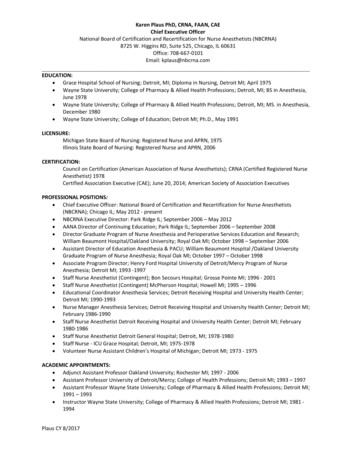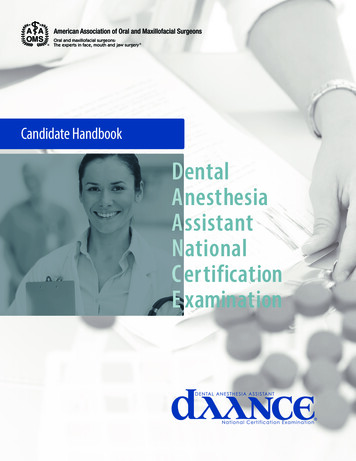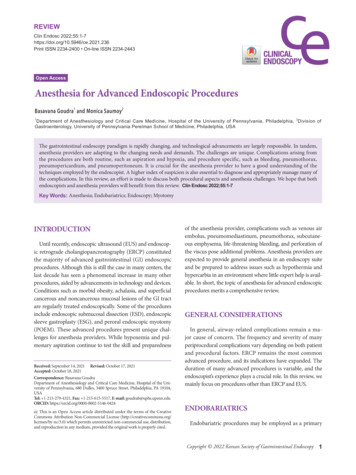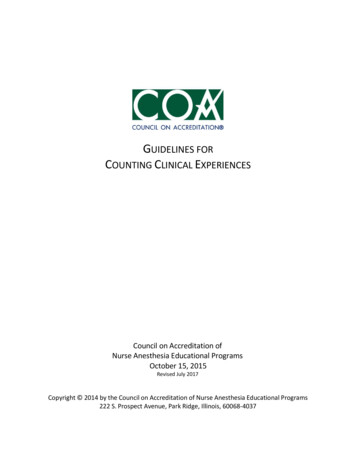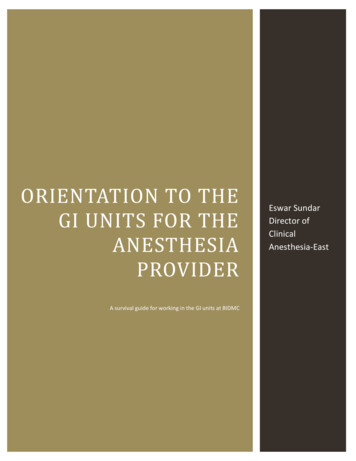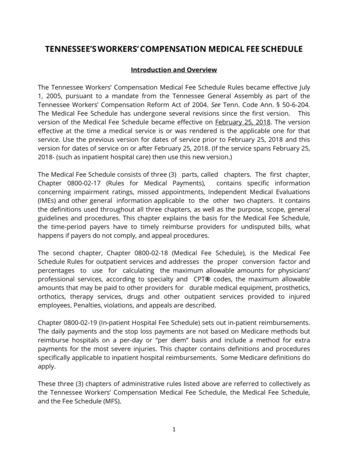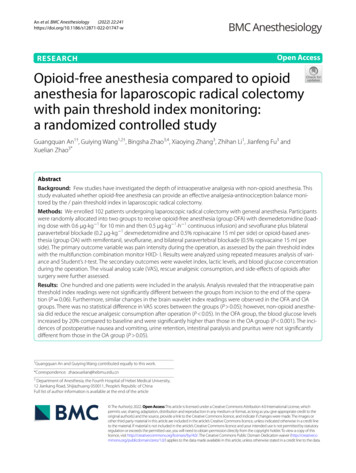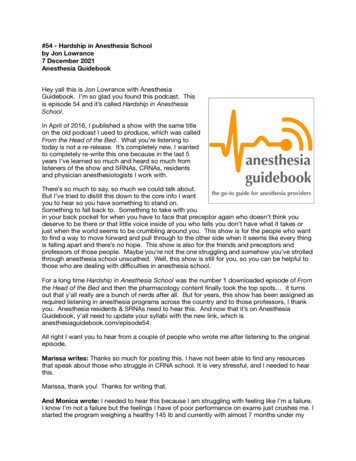
Transcription
#54 - Hardship in Anesthesia Schoolby Jon Lowrance7 December 2021Anesthesia GuidebookHey yall this is Jon Lowrance with AnesthesiaGuidebook. I’m so glad you found this podcast. Thisis episode 54 and it’s called Hardship in AnesthesiaSchool.In April of 2016, I published a show with the same titleon the old podcast I used to produce, which was calledFrom the Head of the Bed. What you’re listening totoday is not a re-release. It’s completely new. I wantedto completely re-write this one because in the last 5years I’ve learned so much and heard so much fromlisteners of the show and SRNAs, CRNAs, residentsand physician anesthesiologists I work with.There’s so much to say, so much we could talk about.But I’ve tried to distill this down to the core info I wantyou to hear so you have something to stand on.Something to fall back to. Something to take with youin your back pocket for when you have to face that preceptor again who doesn’t think youdeserve to be there or that little voice inside of you who tells you don’t have what it takes orjust when the world seems to be crumbling around you. This show is for the people who wantto nd a way to move forward and pull through to the other side when it seems like every thingis falling apart and there’s no hope. This show is also for the friends and preceptors andprofessors of those people. Maybe you’re not the one struggling and somehow you’ve strolledthrough anesthesia school unscathed. Well, this show is still for you, so you can be helpful tothose who are dealing with di culties in anesthesia school.For a long time Hardship in Anesthesia School was the number 1 downloaded episode of Fromthe Head of the Bed and then the pharmacology content nally took the top spots it turnsout that y’all really are a bunch of nerds after all. But for years, this show has been assigned asrequired listening in anesthesia programs across the country and to those professors, I thankyou. Anesthesia residents & SRNAs need to hear this. And now that it’s on AnesthesiaGuidebook, y’all need to update your syllabi with the new link, which isanesthesiaguidebook.com/episode54.All right I want you to hear from a couple of people who wrote me after listening to the originalepisode.Marissa writes: Thanks so much for posting this. I have not been able to nd any resourcesthat speak about those who struggle in CRNA school. It is very stressful, and I needed to hearthis.Marissa, thank you! Thanks for writing that.fififfifiAnd Monica wrote: I needed to hear this because I am struggling with feeling like I’m a failure.I know I’m not a failure but the feelings I have of poor performance on exams just crushes me. Istarted the program weighing a healthy 145 lb and currently with almost 7 months under my
belt, 125lbs. It’s like I’m watching me melt away because I am too busy studying to eat. Selfcare they don’t tell you that you may go for 4 days without showering because you prioritizestudying over bathing. Because you are trying to get ahead. That you have to learn how to liveagain by yourself as in my case and want to cook. Vicious cycle of seeing eating & bathing aschores rather than self care. I was almost lost but thank God my ancé and some classmatesnoticed the invisible.Because that’s how you feel.Invisible and no one cares.I’m not suicidal but am su ering from depression since the start of program.I was happy before school, going out and having a life.Anesthesia school just punches you in the ovaries.Ahhh I love that. Anesthesia school just punches you in the ovaries.Monica, you nailed it anesthesia is hard and the di culty is often invisible to the people inour lives. But their support is crucial to our success.It’s wild. I’ve heard from so many of you over the years about the experiences you’ve had ingetting through school. There’s so many stories to share but rst, I want to frame whyanesthesia school is so hard for a minute. Then we can talk about how to move through it.#1. Anesthesia school is hard because life is hard.and#2. Anesthesia school is hard because anesthesia school is hard.Those are 2 di erent realities and to make sense of each of them we need to look at themseparately. The challenge, obviously, is that just because anesthesia school is hard, doesn’tmean life gets any easier. You don’t get a break on all the chaos around you just because youenroll in one of the hardest graduate programs or residencies available.So let’s look at the rst reality:Anesthesia school is hard because life is hard.Now, right o the bat, this isn’t about comparison. Your journey is your journey. You might nothave faced the same hardship that someone else has but your path is still hard for you. That’snormal and just how life works. I’ve read three books this year that unpack the incrediblestories of people who overcame a level adversity that I will hopefully never know. I tell youabout them just to stick some guideposts in the ground. Here’s 3 people who, due to nochoice of their own, experienced incredible hardship and they each, in their own ways, for theirown reasons, found a way to pull through, keep going and not let their circumstances de nethe way they choose to live and think and move forward.The rst is Trevor Noah’s autobiography Born a Crime. The second is David Goggins’ Can’tHurt Me and third is Laura Hillenbrand’s biography of Louis Zamperini titled Unbroken.fifififfifffffifffffiTrevor Noah, who is the host of the Daily Show on Comedy Central, grew up poorer than pooron the streets of South Africa and endured racism & discrimination as the son of a blackwoman and a white man in the era of apartheid - hence, the name of his book, Born a Crime.It was illegal for members of di erent races to marry or have children together. His fatherabandoned him & his mother at an early age and he grew up under constant abuse from his
stepfather. I simply cannot do this book justice in telling you about it. Trevor reads theaudiobook himself and brings to life the hero of the story - his mother - through her accent andthe numerous South African languages he’s uent in. It’s one of the best books I’ve everlistened to and I would highly, highly recommend it. It’s at once heartbreaking, inspiring andincredibly funny.The second book is Can’t Hurt Me by David Goggins. Goggins is a former Navy Seal operatorand successful ultra-marathoner and endurance athlete who’s become widely regarded as anin uential voice on mental toughness. He grew up under relentless and extreme physical andemotional abuse from his father, who also targeted his older brother and mother. Hisautobiography, Can’t Hurt Me, like Trevor Noah’s, draws its title from some dark, dark places inthe author’s life. Goggins crawled out of that place of incredible pain and hardship to go on tobecome an extremely successful special forces operator and endurance athlete who makes ithis mission to inspire others to dig deeper and quote “STAY HARD!” The fundamentalchallenge he throws down is that when most people have given all they have and are at theend of their abilities, they’re probably still operating at about 40% of their real capacity. He willencourage you to dig deeper and nd that next gear in order to claw your way towardssuccess. While I wouldn’t recommend his strategy for running your rst 100 miler, (Gogginspushed himself to a state of rhabdomyolosis where he pissed brown sludge and blood duringhis rst 100 mile run), I would absolutely recommend this book to help you recalibrate your setpoint for what you believe is possible for your life.And last book I want to mention is Unbroken by Laura Hillenbrand, which was made into ablockbuster lm produced by Angelina Jolie. It tells the real life story of Louis Zamperini, whomay in fact be the hardest person ever to live. Zamperini competed in the 1936 Berlin OlympicGames in the 5000 meter run, earning 8th place as the Nazis built up their cultural and warmachine. In a few short years, World War II broke out and Zamperini joined the United StatesArmy Air Force. He was stationed in the paci c and on a search and rescue ight for a planethat didn’t return to base, his own aircraft crashed into the ocean due to mechanical issues.Eight of the 11 men on board died in the crash and Louis and 2 others managed to survive,adrift at sea in a life raft. The story of his survival at sea is harrowing. The men were pursuedand attacked for days by sharks, slowly starved due to lack of food and fresh water and wereeven attacked by the only plane that happened to see them - a Japanese military aircraft. Allof the men survived that attack but after 33 days, Francis McNamara succumbed to starvationand Zamperini & Russell Phillips, the other survivor, pushed his body overboard. After 47 daysadrift - the longest anyone was known to have survived lost at sea up to that point - the pairwashed up on a Japanese controlled island severely malnourished and dehydrated and wereimmediately captured as prisoners of war. For the next 2 years they were tortured in POWcamps with Zamperini, because of his status as a former Olympic athlete, being singled out forespecially brutal and inhumane treatment. Despite enduring episodes on top of episodes ofunthinkable torture and hardship, Zamperini not only survived but went on to forgive hiscaptors and lead a life of inspiration and grace until his death in 2014 at the age of 97.Unbroken is an incredible read and I highly recommend it. For the cli notes version, again,you can watch the blockbuster lm in an evening online.flfffififlfififififlI’m telling you about these books to, one, point you to some amazing stories I think you shouldcheck out and, two, to speak to the myth of comparing hardship to hardship. I have neverexperienced the level of hardship, abuse & torture these three men have, each in their ownways. I’ve never scrapped for food in POW camp or in the trash cans of South African streets.I’ve never been whipped till I bled by my father or been discriminated against because of thecolor of my skin. But my journey has still been hard for its own reasons. And so has yours.And we can look to the stories of others to hear how they dug deep, found another gear andkept going. So when I tell you the stories of the folks in the coming minutes who faced
incredible hardship in anesthesia school, it’s not to diminish your path or your experience. Weall face hardship. And each of us is called to overcome the challenges in our life in order torede ne what is possible and achieve our goals.So let’s talk about how anesthesia school is hard because life is hard.Life doesn’t stop or give you any breaks because you decided to become an extremelyspecialized healthcare provider.There’s never a great time to go to med school and residency. There’s never a great time topick up your nursing degree, work for years in the ICU and then go back to grad school tobecome a doctorally-prepared CRNA. There’s never a great time to have kids, quit your job,amass a dump truck load of debt and pursue your dreams.So what can happen during anesthesia school or this journey to become a provider?Literally anything. I don’t mean that to scare you but just to be real.I reached out to various social networks back in 2016 when I rst produced this show andasked for people to tell me their stories. I heard from SRNAs, CRNAs and program directors.I’ve heard from so many of you since then. Here’s what some of you have faced:You get cancer and have to drop out of school for chemo/radiation and surgery.Your kid, spouse, other family member or pet gets sick.Your child, spouse, parent or grandparent or pet dies.Sometimes due to illness.Sometimes due to accidents.Sometimes due to suicide.Sometimes due to murder.Yeah. It’s super heavy sometimes.One SRNA I heard from got Guillain Barré and missed months of clinical as she recovered.Another SRNA’s father was dying of liver failure and he chose to donate part of his own liver tohis father. So he had major, major surgery during anesthesia school to try to save his dad.So many of you were like me and went through or are going through a divorce in anesthesiaschool. I don’t talk about mine much because I believe my ex should have the ability to tell herside of the story if I’m telling mine. But the short of it is that I was married for 8 years beforeanesthesia school and my wife left six months into school, which was the culmination of a slowunraveling of our relationship. We owned a house together. And had two dogs. And a bunchof mutual friends. And she was my nancial support.My family gathered around me the month she left and I took my eyes o my nal exams thatsemester and bombed one of the tests. While my grades were good enough to continue in theprogram, my GPA momentarily dropped below 3.0 and I lost all my nancial aid.Let me unpack that for just a sec.fifffififlfififiA CRNA who I really respected when I was an ICU nurse told me that no one cares what yourGPA is in school and that “B CRNA”. That you don’t have to go crazy trying to get straightA’s. So I kind of cruised the rst semester and had a at B-average midway through the
second semester when my wife checked out. I took a C in one class that semester and wasleft with a 2.9 GPA. My program allowed SRNAs to get 1 C and still continue. What I didn’tknow is that the graduate school required a 3.0 GPA to maintain nancial aid. So not only wasI going through a divorce with zero nancial support for my mortgage, gas or groceries, but Isuddenly had no money for school. Or gas. Or groceries. No loans equaled no CRNA school.I was done.When I received the letter from the nancial aid department that my student loans werecanceled I was absolutely crushed. How could I have let myself get to that position? I wouldhave been angry at the CRNA who gave me the advice that “B equalled CRNA” if I didn’tunderstand that the whole situation was 100% my fault.I went to my program director to tell him I was leaving the program.It was one of the worst days of my life.If you’ve ever been in an existential crisis, you’ll know a little about where I was.I was ready to go back to being an outdoor guide and resolved that living out of the back of myJeep Wrangler between backcountry courses probably wouldn’t be that bad.But my program director believed in me.And you should know his name: he’s Shawn Collins.He’s at Loma Linda University now and if you’re there, you’re lucky to have him as your dean.He wrote a letter of support to the nancial aide department vouching for me and they, againstgrad school policy, re-instated my federal loans so I could continue in the program.I’ve never talked about this before on the podcast and rarely even to the people I work with.It was the lowest point for me in my program.And this was before my dog died and my grandfather died.Those heartbreaks would come later while I was in school.I resolved at that point in time that I would become a CRNA for myself. That this was in factthe path that I wanted to be on and that no one could undermine it but me - not a partner wholeft or a CRNA with suboptimal academic advice.And from that moment on I never made another B - much less a C - in the program. I resolvedto gure out how to make A’s. I found another gear. I taught myself how to study and what Ineeded to do to get as far away from a letter grade C as possible. And I made a 4.0 the rest ofthe program.I can’t tell you how di cult that experience was for me. It would take the whole podcast andmore. And we have other things to talk about. But I will tell you that it’s out of this dark cave,this desperate and bleak moment in my life that I came to understand two things: the kindnessof others who reached out and supported me while I was failing - not after I had sorted my shitout but actually during the worst of the shit storm - and that with the right motivation andcoaching, we can dig deep, nd another gear and claw our way out of any darkness towardsthe path we want to be on. My experience in grad school fuels so much of my desire to talkabout wellness and mastery of craft and precepting and leadership and ownership and goalsetting and becoming.Because there’s this magic that happens when hardship sets in all around you like a thick fog.fifififififfifiThe deeper your pain is. The harder your path is. The more you will have to give out of thatstory once you push through and come out on the other side. It may take years before you’re
there, before you see the story for what it is. But you can churn all that pain into a deep,abiding purpose if you want to.All right here’s some other peoples stories just to cap o on this part of the podcast:I’ve talked to parents who live in strained marriages because the one in school or residencyisn’t there to help parent. They feel absent. They feel like they’ve broken promises. Theirpartner feels resentful or doesn’t understand.I’ve talked to SRNAs who feel like their preceptors are out to get them. One, a female, told methat the female CRNAs at her clinical site picked out one female SRNA each year to weed outof the program by making their life hell. That year, the other girls in her program had alreadydropped out so she was it. She bore the brunt of their brutality and scorn.Others have lived apart from their families, spouses & kids for extended amounts of time.Others have had preceptors divert drugs and blame it on the SRNA.Others have been the ones diverting drugs and had to come clean. Or worse.I had a classmate who diverted from clinical and took her life during our program. She was anamazing human being with her whole life ahead of her.Suicide in anesthesia school, med school, residency and even once you’ve made it to otherside and are in your profession as an anesthesiologist is not uncommon. But it’s not a choiceyou have to make. Because there is a way out. There’s a way forward.Even if you’ve messed up in ways that you think are irredeemable.A couple of years ago a SRNA took her life because supposedly her program had caught herdiverting drugs from clinical due in order to self-medicate for chronic post-surgical pain. Shewas a couple months from graduation and had accepted a job as a CRNA.I’m telling you, there’s a way forward even from a situation like that. There’s counseling andrehab and license reinstatement programs for a reason. No job, no career, is worth taking yourlife. That’s a distinction from those who give their life in the line of duty. That’s somethingcompletely di erent. A military service member, re ghter, police o cer, parent or bystanderwho gives their life in the service of others is di erent. Of course there’s reasons to give yourlife. But to take your life by suicide because of what people will think about you or thepossibility of you not becoming a CRNA or physician anesthesiologist is just not worth it. Youcan circle back. Regroup. Sort it out, nd the support you need and move forward in thefuture whether in anesthesia or some other career path. But stay here. People love you andneed what you have to o er. And that’s the rock bottom truth. You’re worthy of a life lived wellwhether that’s as a healthcare provider or on some other path.At the end of this episode and in the show notes, I’ll go over some resources for those of youwho may be in crisis or need support in some way so keep listening.Ok. Other stories.ffifffififffiffffAnother SRNA had to get a restraining order against her husband. She was living away fromher parents and other family during anesthesia school but also trying to take care of her youngchildren who lived with her. She made it. Against all odds, and with the help of her friends,
family, program director, preceptors, safe houses and lawyers, she pulled through and keptgoing. She sent me a photo of her national certi cation exam results with the big word “PASS”on it and I could have been more stoked!Others have failed boards. Peter Strube, who mentors SRNAs towards successfully passingboards and who I interviewed on that topic in episode 14 of the podcast, told me that he’sworked with SRNAs who have taken 7 tries on the board exam before passing. I was surprisedto nd out when I was a SRNA that one of my clinical coordinators and chief CRNAs at a sitefailed boards the rst time. Failing boards doesn’t mean you can’t be successful. It means youfailed a test. And that you have to gure out how to pass it. And that you will be strongerwhen you do.Other SRNAs have faced discrimination or hardship because of their race, sexual orientation orreligious practices.An alarming and nauseating number of SRNAs, residents & medical students have facedsexual harassment by clinical preceptors, professors and surgeons.Others have attended suboptimal schools and residency programs. We shouldn’t overlook thisreality. Our trainees and our patients su er when anesthesia training programs are not whatthey should be.- Some schools have actually closed with active trainees in their programs who have had totransfer to other programs.- A physician resident in California recently reached out to me to talk about how they’restruggling because they feel they’ve been targeted by their program faculty for subpar clinicalperformance early in the program and they can’t shake the target on their back no matter howhard they try to improve and implement the feedback they’ve received. Their chief residentsaren’t advocating for them and they doesn’t see a way forward in their current program.Many, many anesthesia trainees show up to clinical day after day and work with preceptorswho make their lives miserable and fail to understand best practices in clinical education. Thisis another reason while clinical education and precepting is such a huge focus of mine. I’vebeen presenting at state association meetings on the art of clinical education in hopes ofhelping other providers - who are experts in their anesthesia practices - learn the separate setof skills associated with clinical education and precepting. Because being an expert providerdoes not mean you are an expert clinical educator. They’re di erent skill sets.Folks. I’ve just scratched the surface here. I could go on and on.We haven’t even mentioned COVID-19 and how that’s resulted in furloughs and anesthesiatrainees and their kids and spouses and family members becoming sick and in some casesdying all the while these folks are trying to make up missed clinical time and get through theirprograms.Anesthesia training is hard because life is hard. Life doesn’t stop because you decided to goto anesthesia school.So I want you to know that You’re Not Alone.fffifffififiThere’s other people out there who are struggling.
This isn’t about comparison. I don’t tell these stories in order to tell you you’re supposed tofeel better about the crap you’re facing. That would be disingenuous and not helpful.I tell you these stories and my own story and about Trevor Noah and David Goggins and LouisZamperini in order to say:You’re not alone.Others have faced external dragons and personal demons.Others have faced program directors and preceptors who don’t know the pain they’re in icting.Others have faced discrimination and harassment.Others have faced hardship they didn’t ask for or anticipate.And they’ve made it.That’s not to say that your situation should not be optimized. That abuse, discrimination orharassment should be tolerated. Or that the hardship you and your partner or children areexperiencing because you’re in school shouldn’t be addressed. Not at all. There areprocesses and paths for addressing each of those things.One SRNA decided to bring attention to sexual abuse she witnessed from a surgeon to hispatient after the patient was under anesthesia. It was managed with the absolute utmostseriousness and decisively by the hospital and program administration.Other anesthesia trainees have found help through friends, family, preceptors, program faculty,other residents & SRNAs, hospital peer-to-peer support programs, counselors and lawyers,You are not alone. Help is available. Anesthesia school is hard because life is hard and lifedoesn’t stop just because you enrolled in an incredibly challenging program.And that’s part two of this podcast and what we should talk about next.Anesthesia school is hard - super hard, surprisingly hard - because anesthesia school is hard.There’s a distinction I want to make right of the bat here between physician anesthesiaresidency programs and CRNA programs. Now, before I do that, both are hard. I’m not goingto dabble in mediocre arguments by trying to say one is harder than the other. They both teachthe same science and art of anesthesia from the same textbooks to same scope of practiceand skill set. The politics in anesthesia is not the point of this podcast, although, come to thinkof it, the politics of anesthesia are a big part of what makes a career in anesthesia hard forCRNAs, physician anesthesiologists and AA’s alike. The politics of anesthesia can be a hugesource of frustration, stress and burnout for any type of anesthesia provider and trainee. Butthat’s a topic for another podcast altogether.The distinction I want to make between physician training and CRNA training is this:flIn medicine, physicians are largely on a linear trajectory. You do undergraduate school,medical school and residency. People around you are generally supportive of the idea that youwant to become a physician. That’s not to say that all of your preceptors & faculty are friendlyand supportive. But they get that you want to be a physician. And you sort out what kind ofphysician you want to be along the way. And once you choose that program of training,generally speaking, you’ve found your tribe. Those folks are excited to have you. You want tobe a urologist? Great the urologists are happy to have you. You want emergency medicineand are lucky enough to get accepted into a residency: stellar, the EM folks are out to train youto become the best. You want internal medicine or peds or surgery or neurology or radiology
Nursing professors generally are not too excited for nursing students who show up to nursingschool espousing how they want to become CRNAs. It may seem odd and that’s because it is.It’s a not-too-well-kept secret that if you want to become a CRNA you’d better not tell yournursing faculty of your plans. Or your ICU nurse managers. We do an absolutely terrible job asa nursing profession in training individuals who are outside of healthcare or not yet in nursinginto becoming advanced practice registered nurses. This where the adage that “nurses eattheir young” comes in. If you show up to med school and tell folks you want to be surgeon ora physician anesthesiologist, your faculty are probably going to support you because that’s thepoint of what you’re doing. You’re in med school. You’re supposed to choose a focus orspeciality and become that kind of physician. But if you show up to nursing school and sayyou want to become a nurse anesthetist, you’re likely to be sco ed at or shunned. If you tellan ICU nurse manage that your goal is to get into anesthesia school in a year or two, they’relikely not going to hire you or invest time and energy into you. They want to hire ICU nurses.But ICU nursing is a requirement for admission to CRNA training programs. We just haven’tgured out how to train RNs to be ICU nurses who are actually on a long range path to becomeanesthesia providers. It’s not linear.And so while both anesthesia training programs are ridiculously hard, I see both types oftrainees at the level 1 trauma center where I work as the SRNA clinical coordinator - it’s theSRNAs who face this oddity in their path where along the way they can’t get too excited aboutbecoming CRNAs lest they get especially beat down by those in power along the way.It would be an easier path if, like physician training, nurses gured out a way to embrace thoseentering the profession who’s sole focus is to train to become a CRNA. Even nursepractitioners have RN to NP integrated training programs. But CRNAs, because we must goget a real job outside of a training program in an ICU to gain the critical care experience prior toanesthesia training, our path is not direct or met with consistent support and that makes ituniquely challenging.Ok. So, I know that was a bit of a tangent but it’s worth talking about.But how do we deal with the fact that anesthesia school is hard because anesthesia school ishard?Well. We need to level up.Anesthesia training is di erent than medical school. And it’s wildly di erent than nursingschool and ICU nursing.Whether you’re a physician resident or SRNA, you have to learn to take an incredibledegree of ownership for your actions and couple a voluminous depth of information withrapid, correct and highly skilled actions under time pressure in the clinical setting.fffffiffffThat’s what anesthesia training is about.ffifior infectious disease or pulmonology or cardiology and on and on there’s a tribe waiting foryou. There’s residency program directors excited for the med students who match to theirprograms. Now, of course, like any profession and as I’ve stated earlier, there’s programdirectors and clinical preceptors who subpar for any number of reasons and can make trainingthat much more di cult. But what I want to draw attention to just for a minute is that trainingto become a CRNA is very di erent than training to become a physician anesthesiologist in thelevel of support you get from the outset.
I’m currently enrolled in a clinical education workshop o ered through the Maine MedicalCenter Institute for Teaching Excellence. It’s designed to help advanced practice providersimprove their skills at clinical education. I’m the only CRNA in the program as everyone else iseither a PA or nurse practitioner. Interestingly, one of the PAs described her domain inhealthcare as non-procedural so therefore free from having to rapidly perform skills andprocedures under time pressure. It struck me as she said this that executing h
#1. Anesthesia school is hard because life is hard. and #2. Anesthesia school is hard because anesthesia school is hard. Those are 2 different realities and to make sense of each of them we need to look at them separately. The challenge, obviously, is that just because anesthesia school is hard, doesn't mean life gets any easier.


